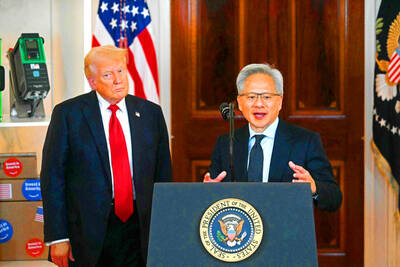HTC Corp (宏達電), the world’s No. 5 smartphone maker, is planning to collaborate with Taiwanese retail partners to boost its smartphone sales in China, a company executive said on Thursday.
The Taoyuan-based company began using its HTC brand last year to sell smartphones in China, and Jack Tong (董俊良), president of HTC North Asia, said the strategy has paid off, with sales growing at a stable pace in the second quarter.
“This year we will focus on the increase of retail locations and the connection between our brand and channels,” Tong said at a press conference to launch the HTC ChaCha smartphone.

Photo: Patrick Lin, AFP
“Taiwanese retailers Senao International Co (神腦國際) and Synnex Corp (聯強國際) both have a roadmap in China, and we’re in talks with them on cooperative efforts that will mobilize sufficient retail resources in tier one and tier two Chinese cities to increase our sales,” he said.
In the period from April to last month, HTC’s revenue and smartphone shipments in East and Southeast Asia maintained a high level of growth and were in line with the company’s expectations, especially in Taiwan, Vietnam, Hong Kong, South Korea and China, according to Tong.
“Our smartphone sales in Taiwan hit a high in the second quarter, driven by the high purchase volume of domestic telecoms operators,” he said.
“We’ll try hard to retain our good relationship with these carriers, hoping that third-quarter sales will grow sharply from the previous quarter on the back of such models,” he said.
The company had consolidated sales of NT$124.4 billion (US$4.3 billion) in the second quarter, a quarterly record for the company and higher than analysts’ prediction of NT$120 billion.
Meanwhile, HTC yesterday denied a newspaper report that VIA Technologies Inc (威盛電子) is considering selling patents to the company, according to a statement to the Taiwan Stock Exchange.
Both HTC and VIA are run by Cher Wang (王雪紅), the richest person in Taiwan according to Forbes magazine’s list of billionaires that was published in March.
The Commercial Times, a -Chinese-language newspaper, said VIA might sell more patents to HTC in a bid to help the latter win patent lawsuits against Apple Inc.
This report came after HTC last week announced it would buy California--based S3 Graphics Co from VIA for US$300 million, as the initial ruling from the US International Trade Commission earlier this month suggested Apple infringed on two patents held by S3 Graphics.
“The report is purely media speculation and untrue,” HTC chief financial officer Winston Yung (容覺生) said in the statement.
ADDITIONAL REPORTING BY KEVIN CHEN

Taiwan Semiconductor Manufacturing Co (TSMC, 台積電) last week recorded an increase in the number of shareholders to the highest in almost eight months, despite its share price falling 3.38 percent from the previous week, Taiwan Stock Exchange data released on Saturday showed. As of Friday, TSMC had 1.88 million shareholders, the most since the week of April 25 and an increase of 31,870 from the previous week, the data showed. The number of shareholders jumped despite a drop of NT$50 (US$1.59), or 3.38 percent, in TSMC’s share price from a week earlier to NT$1,430, as investors took profits from their earlier gains

AI TALENT: No financial details were released about the deal, in which top Groq executives, including its CEO, would join Nvidia to help advance the technology Nvidia Corp has agreed to a licensing deal with artificial intelligence (AI) start-up Groq, furthering its investments in companies connected to the AI boom and gaining the right to add a new type of technology to its products. The world’s largest publicly traded company has paid for the right to use Groq’s technology and is to integrate its chip design into future products. Some of the start-up’s executives are leaving to join Nvidia to help with that effort, the companies said. Groq would continue as an independent company with a new chief executive, it said on Wednesday in a post on its Web

CHINA RIVAL: The chips are positioned to compete with Nvidia’s Hopper and Blackwell products and would enable clusters connecting more than 100,000 chips Moore Threads Technology Co (摩爾線程) introduced a new generation of chips aimed at reducing artificial intelligence (AI) developers’ dependence on Nvidia Corp’s hardware, just weeks after pulling off one of the most successful Chinese initial public offerings (IPOs) in years. “These products will significantly enhance world-class computing speed and capabilities that all developers aspire to,” Moore Threads CEO Zhang Jianzhong (張建中), a former Nvidia executive, said on Saturday at a company event in Beijing. “We hope they can meet the needs of more developers in China so that you no longer need to wait for advanced foreign products.” Chinese chipmakers are in

POLICY REVERSAL: The decision to allow sales of Nvidia’s H200 chips to China came after years of tightening controls and has drawn objections among some Republicans US House Republicans are calling for arms-sale-style congressional oversight of artificial intelligence (AI) chip exports as US President Donald Trump’s administration moves to approve licenses for Nvidia Corp to ship its H200 processor to China. US Representative Brian Mast, the Republican chairman of the US House Committee on Foreign Affairs, which oversees export controls, on Friday introduced a bill dubbed the AI Overwatch Act that would require the US Congress to be notified of AI chips sales to adversaries. Any processors equal to or higher in capabilities than Nvidia’s H20 would be subject to oversight, the draft bill says. Lawmakers would have